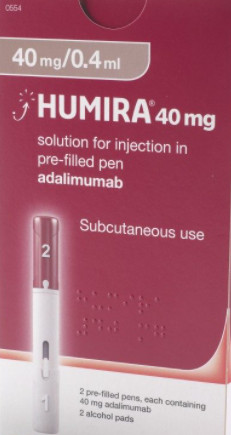Indications
- Plaque psoriasis(moderate to severe).
- Psoriatic arthritis.
- Hidradenitis suppurativa(moderate to severe).
- Pyoderma gangrenosum (off-label).
- Behçet disease (Severe mucocutaneous disease).
- Lupus pernio.
- Recalcitrant granuloma annulare.
- Cutaneous Crohn disease
- Refractory chronic erythema nodosum.
Dosage
- Hidradenitis suppurativa (Humira only): SubQ:
- Initial: 160 mg (given on day 1 or split and given over 2 consecutive days), then 80 mg 2 weeks later (day 15).
- Maintenance: 40 mg every week beginning day 29.
- Hidradenitis suppurativa:
- Children ≥12 years and Adolescents: SubQ:
30 to <60 kg: Initial: 80 mg on day 1, then 40 mg on day 8.
Maintenance: 40 mg every other week. - ≥60 kg: As adults.
- Children ≥12 years and Adolescents: SubQ:
- Plaque psoriasis: SubQ:
- Initial: 80 mg as a single dose.
- Maintenance: 40 mg every other week beginning 1 week after initial dose.
- Pyoderma gangrenosum (off-label use): 80 mg sc as initial dose then 40 mg sc weekly or every other week.
- Behçet disease :80 mg sc as initial dose then 40 mg sc weekly or every other week.
- Lupus pernio:40 mg/wk, subcutaneously.
- Recalcitrant granuloma annulare: (80 mg) was administered subcutaneously, followed by 40 mg every other week.
- Cutaneous Crohn disease: 160 mg given as 4 injections over the first 2 days, 80 mg 2 weeks later (day 15), and 40 mg every other week
Mechanism of action
- Anti–tumor necrosis factor alpha.
- It prevents TNF-α interaction with either TNFR (p55 or p75).
- It can lyze cells that express TNF-α on their surface.
- It can bind to soluble TNF and block its ability to activate TNF receptors.
Baseline Monitoring
- Ask bout:
- History of prolonged immunosuppressant or PUVA therapy(monitor for non-melanoma skin cancer )
- History of cancer.
- Heart problems.
- History of recurrent infections.
- Prenancy or breastfeeding.
- Other drugs.
- Check personal and family history for multiple sclerosis and related demyelinating disorders.
- Vaccination status.
- Travel to regions of the world where TB or fungal infections are common.
- Investigations
- Test patients for latent TB (baseline PPD) & chest X-ray in higher-risk patients.
- Blood tests for HIV, hepatitis B and hepatitis C.
- CBC.
- Liver and kidney functions.
Follow Up Monitoring
- Latent TB screening
- Monitor for
- Signs/symptoms of active infection.
- Symptoms of lupus-like syndrome.
- TB manifesations (persistent cough- night sweets).
Side effects
- Injection site reactions (most common, mild usually do not require treatment)
- Pain, erythema, pruritus
- Urticarial plaques.
- Anaphylaxis and angioedema.
- Infections
- Upper respiratory tract infections.
- Rhinitis.
- Bronchitis.
- Urinary tract infections
- Tuberculosis.
- Septic arthritis
- Fungal pneumonia
- Pyelonephritis
- Malignancy
- Lymphoma
- Non melanoma skin cancers
- Demyelination disease
- Blood abnormalities
- Thrombocytopenia
- Leukopenia
- Aplastic anemia.
- Congestive heart failure.
- Lupus-like syndrome.
- Hepatotoxicity.
Contraindications
- Hypersensitivity to adalimumab or any component of the formulation.
- Severe infection (eg, sepsis, tuberculosis, opportunistic infection).
- Moderate-to-severe heart failure.
- Concurrent administration with anakinra.
- Family history of demyelinating disease.
Interactions
- The use of tumor necrosis factor (TNF) blockers + immunosuppressive or myelosuppressive agents may increase the risk of infections.
- An increased risk of serious infections has been seen with the combination of TNF blockers with anakinra or abatacept.
- Adalimumab may decrease the blood levels and effects of atorvastatin.
- Adalimumab + azathioprine may increase the risk of serious and potentially life-threatening infections.
- Methotrexate decrease clearance of adalimumab.
Pregnancy & Lactation
- Adalimumab is actively transferred across the placenta during the third trimester of pregnancy and may affect immune response in the in utero exposed infant.
- Effective contraception required during treatment and for at least 5 months after last dose.
- Pregnancy category B.
Lactation
- Excreted in breast milk at very low concentrations (limited information available).
Precautions
- Do not start adalimumab during an active infection, including localized infections.
- Discontinue adalimumab if a patient develops a serious infection or sepsis.
- Patients older than 65 years, patients with co-morbid conditions, and/or patients taking concomitant immunosuppressants may be at greater risk of infection.
- Consider empiric antifungal therapy in patients at risk of invasive fungal infections who develop severe systemic illness.
- Patients with initial negative tuberculin skin tests should receive continued monitoring for tuberculosis during and after treatment.
- Active tuberculosis should be treated with standard treatment for at least 2 months before starting adalimumab (monitored every 3 months).
- In patients at high risk of TB who cannot be assessed by tuberculin skin, chemoprophylaxis can be given concurrently with adalimumab.
- Live vaccines should not be given concurrently.
- Malignancies (especially lymphomas) have been reported in patients, including children and adolescents.
- Close monitoring for signs and symptoms of HSTCL (e.g., splenomegaly, hepatomegaly, abdominal pain, persistent fever, night sweats, weight loss) is also recommended during use of TNF blockers, particularly in combination with other immunosuppressants such as azathioprine and mercaptopurine.
- Exercise caution in patients who are carriers of HBV and monitor them during and after TTT.
- Advise the patient to avoid close contact with people who have infections.
- Advise the patient to take extra precautions when in the sunlight to avoid skin cancer.
Drug Info
- Adalimumab is a fully human IgG1 recombinant antibody to TNF-α only
- Patients receiving adalimumab are at increased risk for serious infections which may result in hospitalization and/or death
- Infections usually developed in patients receiving concomitant immunosuppressive agents (eg, methotrexate, corticosteroids) and may present as disseminated (rather than local) disease.
- Annual flu vaccine and a pneumonia vaccination are advised to be given.
- Adalimumab should be withdrawn if the response is not adequate after 16 weeks.
